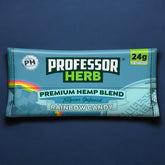CBD and the Winter Blues
CBD (cannabidiol) has gained popularity in recent years for its potential to improve mood and alleviate symptoms of anxiety and depression, including those associated with the "winter blues." The winter blues, or seasonal affective disorder (SAD), is a type of depression that typically occurs during the colder, darker months. People with SAD often experience feelings of sadness, fatigue, difficulty concentrating, and disrupted sleep patterns.
Here's how CBD might be helpful for managing the winter blues:
1. Mood Support
CBD is thought to interact with the body's endocannabinoid system (ECS), which plays a role in regulating mood, stress, and anxiety. Some studies suggest that CBD may help balance mood by influencing serotonin and other neurotransmitter systems. This could potentially help individuals experiencing SAD or mild depression related to the winter months.
2. Stress and Anxiety Reduction
Winter blues can often be tied to increased stress and anxiety, especially as the days get shorter. CBD has been shown in some research to have anxiolytic (anxiety-reducing) effects. It may help promote relaxation without the intoxicating effects of THC, which is another cannabinoid in cannabis. Many people report feeling more at ease and less anxious after using CBD.
3. Improved Sleep
Many individuals with SAD struggle with disrupted sleep patterns, whether it's difficulty falling asleep or waking up too early. CBD is known to have a calming effect on the body and may help improve sleep quality by reducing anxiety and promoting relaxation. Some people use CBD to help them fall asleep faster or maintain a more consistent sleep cycle, which can be important during winter when light exposure is limited.
4. Energy Levels
Fatigue is a common symptom of the winter blues, and CBD's potential to support mood and reduce anxiety might indirectly help with feelings of energy. Though CBD is not a stimulant, it may enhance motivation and help you feel more engaged in activities that can improve overall well-being, such as exercise and socializing.
5. Anti-inflammatory Effects
Some people experience joint pain or other physical discomforts during the winter months, due to cold weather or the sedentary nature of the season. CBD is also known for its anti-inflammatory properties, which might help alleviate chronic pain or muscle stiffness.
6. Potential for No Serious Side Effects
Unlike traditional antidepressant medications, CBD has fewer reported side effects and a lower risk of dependence. This makes it an appealing option for those looking for a natural supplement. However, the effects of CBD can vary from person to person, and more research is needed to fully understand its long-term impact on mental health conditions like depression.
Considerations and Usage:
- Dosage: There's no one-size-fits-all when it comes to CBD dosage. It often requires some trial and error. Many people start with a low dose and gradually increase it until they find what works for them.
- Quality: Not all CBD products are created equal. Be sure to choose high-quality, third-party-tested CBD products that come from reputable brands.
- Consult with a healthcare professional: If you're considering CBD for the winter blues or any other mental health concern, it’s a good idea to talk to your doctor, especially if you’re already taking medications for anxiety or depression, as CBD may interact with some drugs.
Conclusion:
While CBD may offer some relief for the winter blues, it is not a cure for seasonal affective disorder or depression. It can be a helpful part of a broader approach, which might include light therapy, exercise, a healthy diet, and social support. Always speak to a healthcare provider before making any changes to your treatment plan, especially if you're considering CBD as a supplement for mental health.
![Professor Herb Premium Hemp Blend (24g) - Blueberry Cruffin [LIMITED EDITION]](http://professorherb.co.uk/cdn/shop/files/0005__1_165x.jpg?v=1743689907)
![Professor Herb Premium Hemp Blend (24g) - Blueberry Cruffin [LIMITED EDITION]](http://professorherb.co.uk/cdn/shop/files/0003__1_165x.jpg?v=1743689907)







![Professor Herb Premium Hemp Blend (24g) - Blueberry Cruffin [LIMITED EDITION]](http://professorherb.co.uk/cdn/shop/files/0005__1_95x.jpg?v=1743689907)


